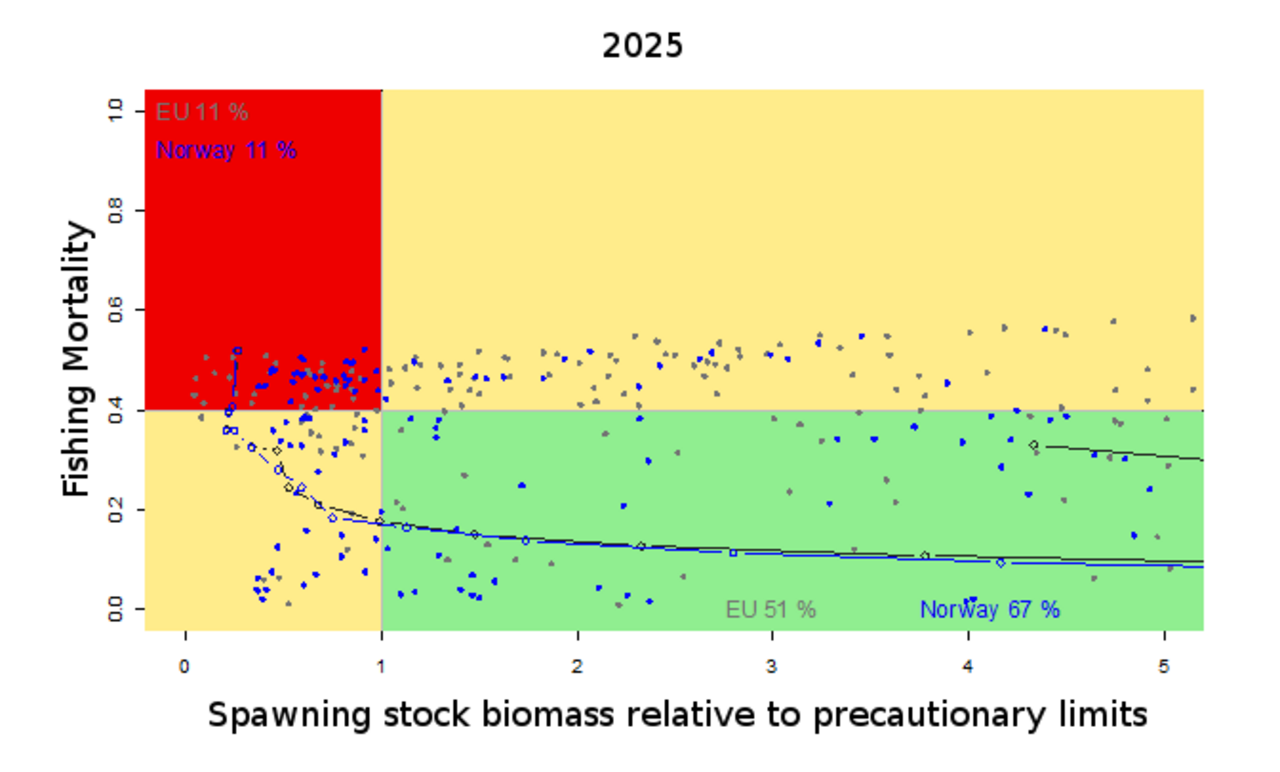Project
Risk assessment in fisheries management

Why does fisheries management sometimes fail? Conduction of risk analyses on various aspects of fisheries management can help to answer this question.
Background and Objective
Long-term management plans become more and more important in fisheries management. Therefore, impact assessments of long-term management plans are currently being intensively discussed. It is attempted to indentify the main risk factors for negative stock developments (e.g. recruitment failure because of climatic effects, illegal fishing). Harvest control rules are developed to minimize the risk of stocks falling below critical reference points even under unfavourable environmnetal conditions. Management measures are identified that minimize the risk of implementation failures.
Target Group
science, politics, economics
Approach
Management strategy evaluations (MSEs) are complex modelling approaches where stocks are simulated but also the management cycle from the assessment to the implementation of quotas. Uncertainties and bias (e.g. illegal landings) are taken into account. With the help of MSEs, the robustness of harvest control rules can be tested and whether a management plan will lead to a sustainable exploitation with high probability. But also main factors leading to a failure of the plan can be identified. We contribute regularly to impact assessments of management plans inside working groups of ICES and STECF.
Our Research Questions
- Which harvest control rules are robust enough to guarantee a sustainable exploitation?
- Which factors can lead to the failure of management plans?
Preliminary Results
Management plan evaluations and impact assessments of ICES and STECF
Links and Downloads
Involved Thünen-Partners
Duration
1.2008 - 12.2027
More Information
Project status:
ongoing
Publications
- 0
De Oliveira JAA, Berges B, Hintzen N, Trochta JT, Bartolino V, Kühn B, Ballesteros M, Batsleer J, Berg F, Bradbrook H, Carruthers T, Cessford I, Moor C de, Howell D, Kvamme C, Laustsen L, Marchal P, Miethe T, Mosegaard H, Rohlf N, et al (2025) Workshop on management strategy evaluation for North Sea herring (WKMSEHERRING). Copenhagen: ICES, 175 p, ICES Sci Rep 7(53), DOI:10.17895/ices.pub.28868798
- 1
Sun M, Li Y, Suatoni L, Kempf A, Taylor MH, Fulton EA, Szuwalski C, Spedicato MT, Chen Y (2023) Status and management of mixed fisheries: a global synthesis. Rev Fish Sci Aquacult 31(4):458-482, DOI:10.1080/23308249.2023.2213769
- 2
Garcia D, Pastoors M, Moesgaard Albertsen C, Balestri E, Bartolino V, Campbell A, Cardinale M, Cervino S, Cole H, Coull K, Curtis D, Fall J, Fallon N, Farrell E, Gerritsen HD, Goni N, Green K, Haase S, Kempf A, Taylor MH, et al (2023) Workshop on guidelines and methods for the design and evaluation of rebuilding plans for category 1-2 stocks (WKREBUILD2). Copenhagen: ICES, iii, 80 p, ICES Sci Rep 5(112), DOI:10.17895/ices.pub.24763293
- 3
De Oliveira J, Bartolino V, Berges B, Björnsson H, Brooks ME, Butterworth D, Campbell A, Cardinale M, Carruthers T, Cerviño S, Chernega G, Cole H, Moor C de, Deroba J, Die D, Duprey N, Fay G, Haase S, Kempf A, Rohlf N, Taylor MH, et al (2020) The third workshop on guidelines for management strategy evaluations (WKGMSE3). Copenhagen: ICES, 112 p, ICES Sci Rep 2(116), DOI:10.17895/ices.pub.7627
- 4
Kraak SBM, Bailey N, Cardinale M, Darby C, De Oliveira J, Eero M, Graham N, Holmes SJ, Jakobsen T, Kempf A, Kirkegaard E, Powell J, Scott RD, Simmonds EJ, Ulrich C, Vanhee W, Vinther M (2013) Lessons for fisheries management from the EU cod recovery plan. Mar Policy 37:200-213, DOI:10.1016/j.marpol.2012.05.002
- 5
Simmonds J, Jardim E, Casey J, Abella JA, Andersen J, Bailey N, Bertignac M, Cardinale M, Curtis H, Daskalov G, Delaney A, Döring R, Garcia Rodriguez M, Gascuel D, Graham N, Gustavson T, Jennings S, Kenny A, Stransky C, Kempf A, et al (2012) Management plans part 2 - developing area vased management plans (STECF-12-14). Luxembourg: Publications Office of the European Union, 72 p, EUR Sci Techn Res Ser
- 6
Simmonds J, Kraak SBM, Berkenhagen J, Cardinale M, Cerviño S, Da Rocha Alvarez JM, Curtis H, Döring R, Eero M, Kempf A, Holmes SJ, Gascuel D, Graham N, Gustavsson T, Jennings S, Kenny A, Kirkegaard E, Kraak SBM, Kuikka S, Stransky C, et al (2011) Evaluation of multi-annual plans for cod in Irish Sea, Kattegat, North Sea, and West of Scotland (STECF-11-07) : This report was reviewed by the STECF during its 37th plenary meeting held from 11 to 25 July, 2011 in Copenhagen, Denmark. Luxembourg: Publications Office of the European Union, 358 p, JRC Sci Techn Rep

![[Translate to English:] [Translate to English:]](/media/_processed_/7/1/csm_IMG_7977_large_1defaf5de1.jpg)






